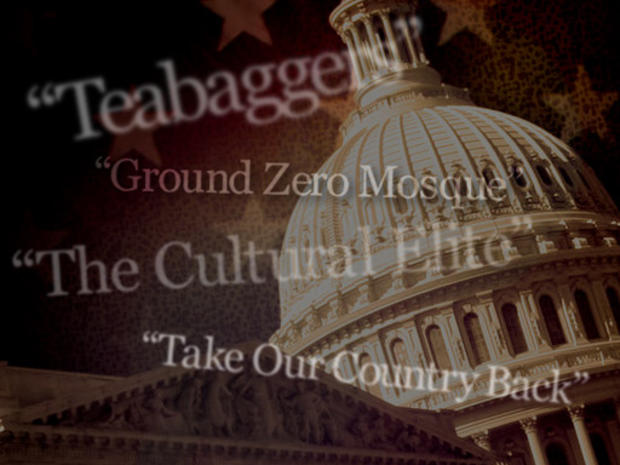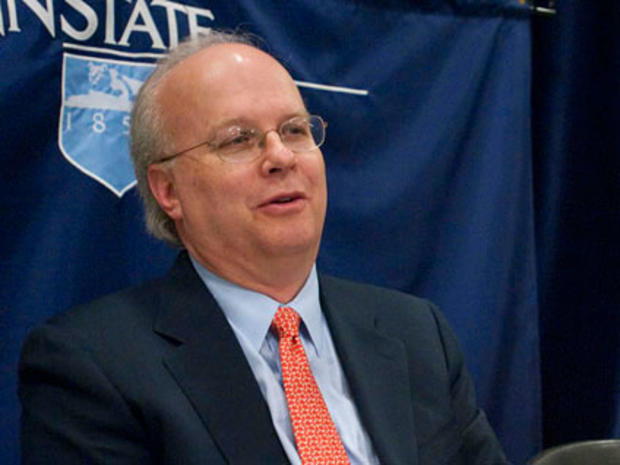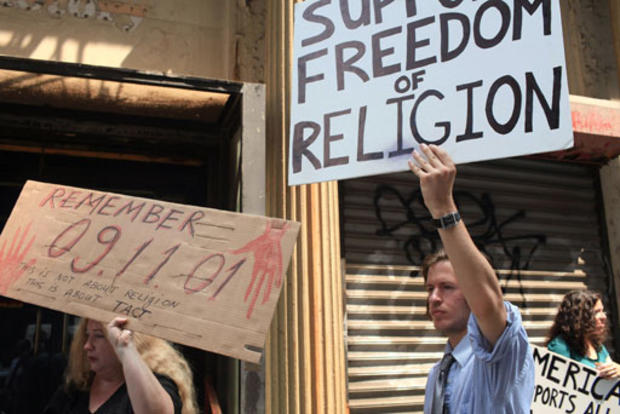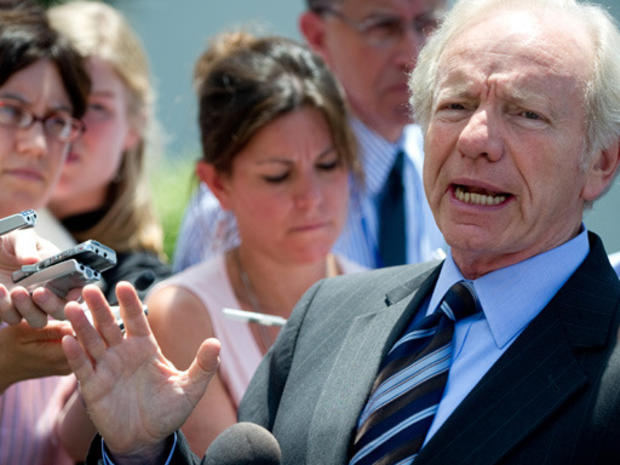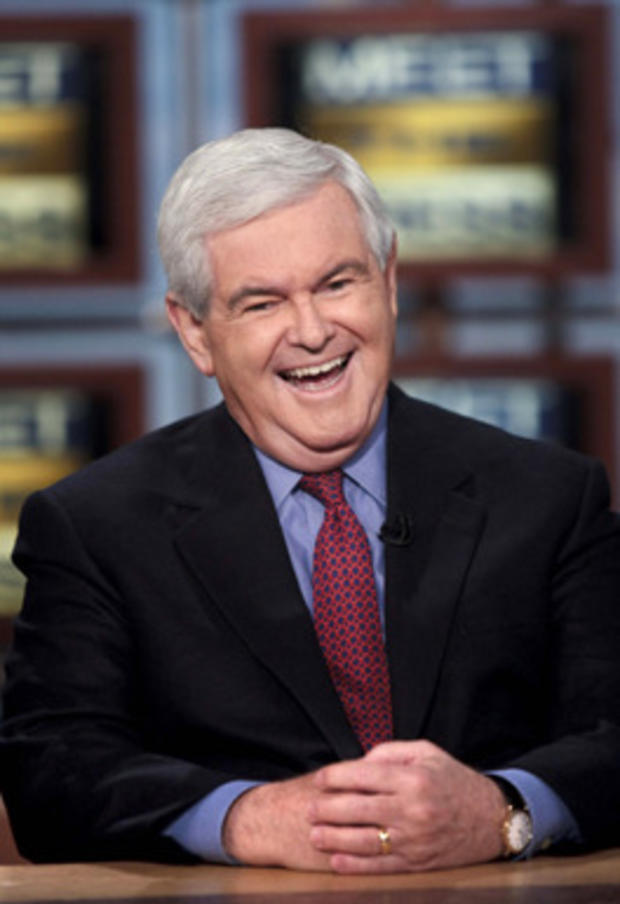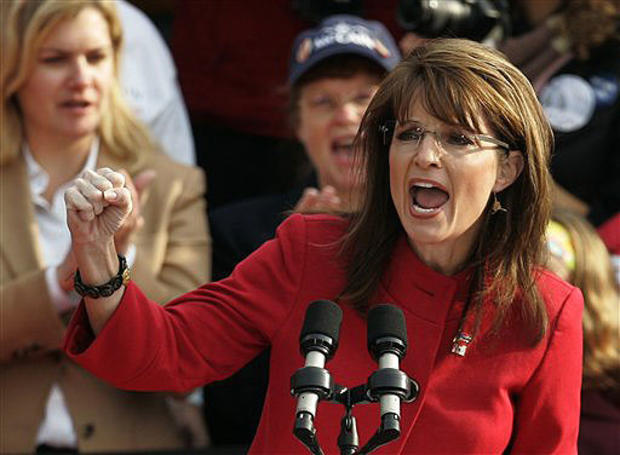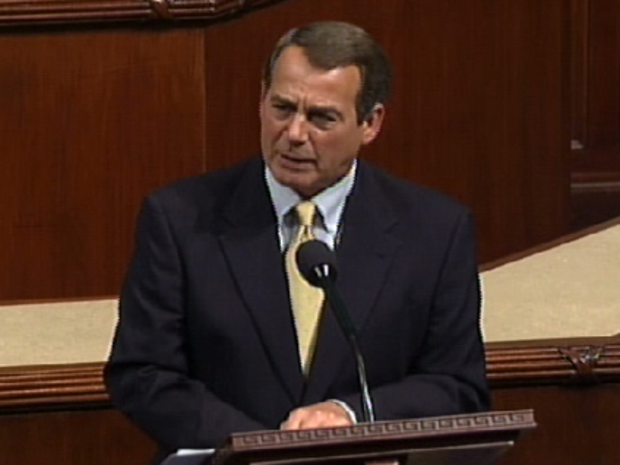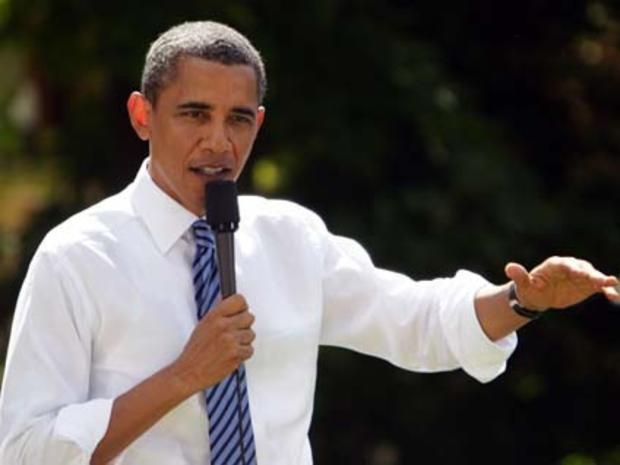The Most Loaded Phrases in American Politics
Click through to check out CBSNews.com's analysis of the who, what and why of the worst phrases to come out of the mouths of America's pundits and politicians.
The Most Loaded Phrases in American Politics
It's the sort of word you might expect to hear from a smirking 14-year-old boy: Critics of the Tea Party movement like to refer to its members as "teabaggers," a reference to a sexual act known as "teabagging," which we're going to refrain from explaining here. To give you an idea of both the meaning of the word and the juvenile way it gets used, consider this comment from MSNBC's David Shuster: "...the teabaggers are full-throated about their goals. They want to give President Obama a strong tongue-lashing and lick government spending."
Some who use this term have pointed out that there are those in the movement who have identified themselves as "teabaggers." But that doesn't excuse the poor taste of opponents of the movement who opt for crude and substance-free attacks instead of seriously engaging the ideas behind the Tea Party movement.
The Most Loaded Phrases in American Politics
When conservatives feel that the government is trying to force on them something they don't like, they have a tendency to complain they are having it "jammed down their throats." Here's the Wall Street Journal's Dorothy Rabinowitz on the so-called "Ground Zero Mosque": "The center may be built where planned. But it will not go easy or without consequence to the politicians intent on jamming the project down the public throat, in the name of principle." The "jammed down our throats" construction was also used repeatedly in reference to the Obama administration's health care overhaul bill.
No one would claim that politics is a gentle game. But Washington is polarized enough already, and it doesn't help when one side is using such crude allusions to score political points instead of opting for less gratuitously confrontational imagery.
The Most Loaded Phrases in American Politics
And speaking of that "Ground Zero Mosque": That three-word phrase has the dubious distinction of being inaccurate not once but twice. The project in question is not actually being planned at Ground Zero - it's planned to go up two blocks away, at the former location of a Burlington Coat Factory that lacks a view of the former site of the Twin Towers.
And it's not, strictly speaking, a mosque - it's an Islamic cultural center that includes a swimming pool, basketball court, restaurant and a prayer room.
It's a lot easier for journalists and opponents of the project to write "Ground Zero Mosque" than to explain exactly what the project really is, of course. (Some news outlets, it should be noted, have stopped using the phrase.) But that doesn't make it right, and it ignores the fact that calling the project by that name negatively frames it in some minds from the outset.
The Most Loaded Phrases in American Politics
The phrase "that's a good question" isn't always problematic - sometimes, after all, questions are actually good. But it is often little more than a stalling mechanism - "A phrase usually indicating that the speaker has absolutely no idea how to answer said question," as the Urban Dictionary puts it.
It also gets used by those who want to signal openness to a controversial position without actually fully embracing it. Senator Joe Lieberman angered supporters of Barack Obama in 2008 when he was asked about a claim that the then-candidate is Marxist. "I must say that's a good question," he responded. Though Lieberman later added "I'd hesitate to say he's a Marxist," the non-answer sounded something like a tacit endorsement of the claim.
The Most Loaded Phrases in American Politics
Prominent Republicans, in an attempt to cast themselves as one with their constituents, love to lament the power of the "cultural elite," usually Democrats like President Obama who want to tell Americans how to live their lives. "It is only from the perspective of the cultural elite that the left-wing governing of the Obama-Pelosi-Reid team could be seen as moderate," Newt Gingrich wrote in April.
Yes, that Newt Gingrich - the thrice-married, doctorate-holding, wealthy Washington insider who makes his living giving speeches at think tanks and selling his opinions in books and other forms. The problem with the lamentation of the "elite" by prominent Republicans is that they are almost invariably a part of the club, no matter how much they pretend otherwise.
The Most Loaded Phrases in American Politics
Sarah Palin is perhaps the most prominent Republican to call on her supporters to "take our country back," which prompts the obvious question: From whom? According to liberal New York Times columnist Frank Rich, the phrase is a response to "the conjunction of a black president and a female speaker of the House -- topped off by a wise Latina on the Supreme Court and a powerful gay Congressional committee chairman."
It's fair to quibble with that characterization and argue that it's not the race, gender or sexual orientation that is the motivating factor of those who use the phrase, but rather the policies of those in charge. For many on the right, the phrase is code for kicking out Democrats who they see as committed to taxing and spending. But the latter interpretation still doesn't excuse the us-vs.-them nature of the message - it says the country is "ours," not yours, and we're coming for it. It's the language not of trying to find consensus but of waging cultural and political war.
The Most Loaded Phrases in American Politics
Politicians love to invoke the American people when talking about why their policies are the right ones. According to President Obama, Republicans have a "lack of faith in the American people" because they blocked an extension of unemployment benefits; according to House Minority Leader John Boehner, the president's policies regularly "defy the will of the American people" in pursuit of a far-left agenda.
And while the will of the people is obviously relevant to policy discussions, they are regularly invoked to score political points; the phrase often reduces a group of more than 300 million to little more than a talking point. As a website devoted to tracking use of the phrase noted, many politicians present themselves as self-anointed experts on "what we want, need, feel, think, deserve, demand."
The Most Loaded Phrases in American Politics
As CBS News' Mark Knoller pointed out earlier this year, President Obama, like his predecessors, is fond of insisting he will not rest until something or other gets done. As of February, the president had used the phrase 11 times; last April, for example, he intoned that "We will not rest until we reach a day when not one single veteran falls into homelessness."
The problem, of course, is that that day has not yet come, and yet the president has done plenty of resting - such as during his August vacation at Martha's Vineyard, where he found time to play golf (and presumably get some sleep). That's not to say that the president doesn't have a right to his free time, but only that "will not rest" claims are a bit much when contrasted with photographs of the president clutching his driver.
Mr. Obama is not the first president to say he "will not rest," of course - President George W. Bush alone vowed not to rest 40 times while in office. And it seems safe to assume that, thanks to the rhetorical power of that particular phrase, he won't be the last, either.
